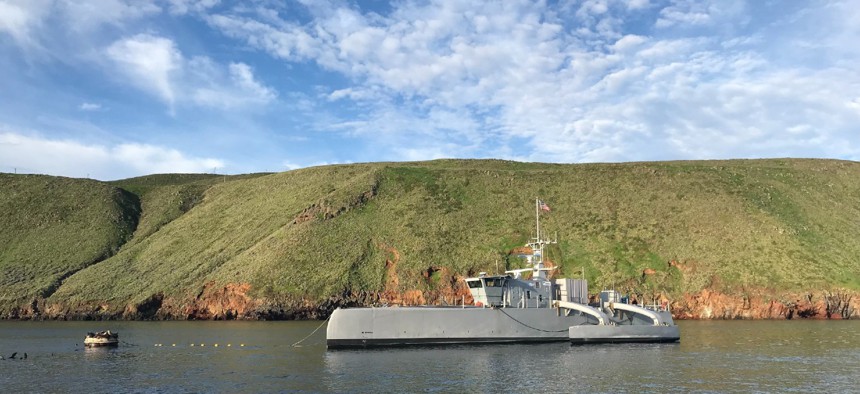
Sea Hunter, an entirely new class of unmanned sea surface vehicle developed in partnership between the Office of Naval Research and the DARPA. Moraima Johnston / U.S. Navy
Leidos Deepens Maritime Reach with Planned Acquisition of Gibbs & Cox Naval Design Firm
It’s the latest move to better position itself for Navy undersea business.
Government contractor Leidos announced plans to buy naval design firm Gibbs & Cox for $380 million, taking aim at an area of U.S. defense spending that is expected to grow amid overall decline: unmanned maritime vehicles and next-generation warships.
“The acquisition of Gibbs & Cox will extend our existing maritime business and add specific capabilities and services, such as naval architecture and Marine Engineering, 3D modeling and design, and specialty engineering to the solution set that we offer to our customers,” Leidos CEO Roger Krone said on the company’s quarterly earnings call Tuesday.
Founded in 1929, the privately held Gibbs & Cox boasts that it has designed “24 classes of combatants” with “nearly 7,000 vessels have been built to G&C designs,” including 5,400 during World War II. The company designed the U.S. Navy’s Arleigh Burke-class destroyer and Freedom-class Littoral Combat Ship; it is currently revising a Fincantieri design to become the Constellation-class frigate.
“In addition to being positioned on the front end of next generation vessels, the business combination provides significant tailwinds for participation in the maritime unmanned market, and accelerates Gibbs & Cox expansion in the undersea domain,” Krone said.
Leidos leaders believe they can expand the Gibbs & Cox portfolio and bolster both companies' chances to win unmanned undersea business.
“We can augment [Gibbs & Cox] with thousands of system engineers and pieces of engineering tools, digital engineering tools, a larger, stable balance sheet that can help invest in business development, technical report resources,” Leidos Defense Group president Gerry Fasano said in an interview Tuesday.
Leidos leaders also believe they can expand the design firm’s reach in the U.K., Israel, and other countries where Leidos already does business. Gibbs & Cox is doing design work for Canada, Saudi Arabia, and Australia.
In recent years, Leidos has expanded into unmanned maritime work with the Sea Hunter anti-submarine and counter-mine drone ship. Manned and unmanned warships are part of the U.S. military’s plans to counter China’s naval advancements and aspirations in the Pacific.
Leidos has also bolstered its portfolio in other areas at the forefront of the Pentagon’s counter-China strategy, with a $1.7 billion acquisition of Dynetics, an Alabama-based firm that specializes in hypersonic weapons, directed energy, space and drone technology.
Leidos plans to operate Gibbs & Cox as a wholly owned subsidiary and keep its name, just as it did with Dynetics.
“The one thing we did not want to do is destroy their brand,” Fasano said. “We will take our maritime business and we will...integrate it into Gibbs & Cox.”
Company officials expect the deal to close in early April after regulatory approvals in the U.S., Canada and Australia, Fasano said.
NEXT STORY: The Day Private Willie Mays Threw Out My Dad







